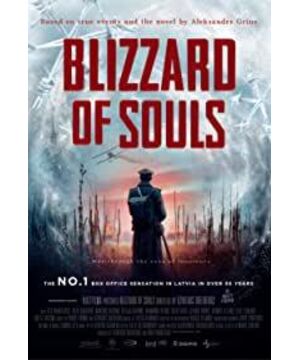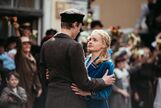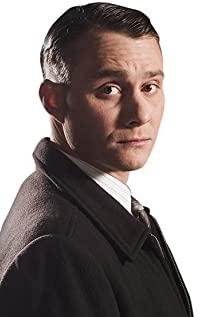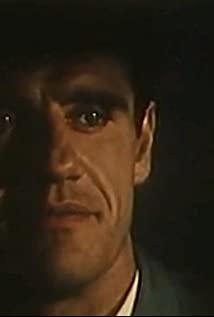This is a Latvian war movie. Thinking about it after watching it, it's still a very good movie. The level of the director is very high, and the photography composition and plot arrangement are unique. From the plot point of view, it can be said that it is a Latvian "Quiet River Don", although the layout is far less than Sholokhov.
The film is set during the First World War. The Germans invaded Latvia. Seventeen-year-old Latour's mother was killed by the Germans. For revenge, he, his brother and his father signed up for the army together, a veritable "father and son soldier". In the barracks, he experienced many hardships and faced many life and death junctures. His father and brother were killed one after another, and Latour himself was wounded many times. In this war, he became a standard soldier, but by accident he participated in the troops of the Tsarist Russia, the Red Army, and almost joined the German troops. Because he didn't want to execute the order to shoot deserters, he instantly became a "traitor". Finally, as a veteran, he joined Latvia's own army, and went to the battlefield with a group of children who couldn't shoot with guns, participating in the famous Battle of Cesis. Unexpectedly, he became a hero.
The film truly describes the brutality of the battlefield. I think it was the same scene not only in Latvia, but in all the battlefields of World War I. High trenches, pig-like meals, sleeping with mice, struggling in the wind and snow. The two were chatting in the trenches, and when a shot was fired, the people around them died. When charging, the people around him fell one by one. At this time, the feeling is that death is normal and inevitable, and living is the one who won the lottery. When they fought face-to-face with the German army, his opponent was a young man like him, with the same fear and timidity in his eyes, and he was equally at a loss. Who can survive depends on who can wake up from this confusion faster and give the opponent a stab. At this time, they have no time in their hearts to think about why they are fighting, for whom they are fighting, and for whom they will die. Because they never thought about it. In this way, countless lives disappeared.
Arthur's father is a veteran. Treating war is not so much a fight for your life as it is a job. He is a very serious and dedicated employee. He trained the recruits seriously, led the soldiers to charge with great dedication, carefully served as a sniper, and was silently killed by the enemy in the end. In fact, most of the soldiers also view war in this way, and no one thinks that participating in war is for the sake of the motherland and the ideal. We are only involved in a very risky job. If you survive, you will die; if you die, you will be injured at work. Artur crawled hard on the snow after being injured, trying to survive. In order to encourage himself and make himself lofty, he kept chanting: "To our brothers and fathers, who died to defend the motherland." No matter how many times he recited it, he did not get excited and excited. After the war, a grand award ceremony was held. The men, women and men in gorgeous clothes gathered in the square in glee and joy. He has matured, and he has seen through death, through war, and through the hypocrisy of politicians. He was not moved to tears, nor was he inexplicably excited. He just stared at the mother who lost her son in the audience with indifference and pity.
In the scene at the end of the film, a devastated Arthur sees his equally haggard girlfriend and they hug. Arthur said: "Let's go home." This is also the last line of the film.
Latvia is a small country. Ethnic complex, religious confusion. It is like a small boat, passing through several giant ships. If you want to go out to sea safely, you can only rely on the wisdom of the helmsman. Either form an alliance, like the Hanseatic League it joined in its earlier years, to keep itself safe. Or like Israel, where all the people have a firm faith and the nation is united as one. However, it is a pity that their politicians are like a group of idiots, without ideals and beliefs, often like a dog, barking after the owner. Unprovoked provocation. As they have been doing over the years. If it goes on like this, it will be overturned by those big ships sooner or later. Unlucky is the people of Latvia. Maybe this is their fate.
Politicians think about power, tycoons think about money, and people give their lives and homes. This is war.
The plot of the film is interesting. In the beginning, Arthur was practising his bike on a peaceful street, with his girlfriend supporting the bike in the back. They laugh freely like everyone else. Suddenly, a group of troops walked into the street. The officer who led the team was fairly kind, picked up his girlfriend's turban and told her, "Let's have fun before the Germans come." Then the ambulance rushed in, and the wounded soldiers were taken to the hospital. Further down, they saw the horse killed by the bomb in the field. Then, the Germans entered the village and killed Arthur's mother. We are strongly aware that the war is coming, and the war has destroyed people's stable lives. The war has destroyed people's homes and taken the lives of their loved ones so quickly. This progressive description is more real and more hateful to war. It also tells us that the people do not have so many lofty ideals, nor do they have too many extravagant demands. They just want their own home and their own peace.
My rating: 6.5.
View more about Blizzard of Souls reviews









